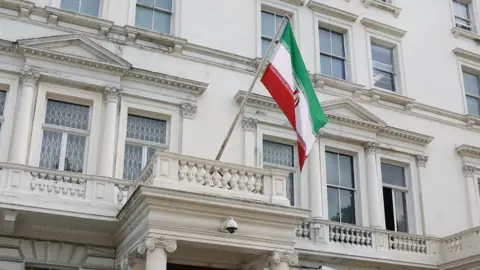The United Kingdom is currently facing an increasing and unpredictable threat emanating from Iran, as highlighted by a recent warning from the Parliament’s intelligence and security committee. This significant report underscores the urgency for the UK government to take more robust action to counteract these threats. The comprehensive inquiry delves into Iran’s state-sponsored activities that include assassinations, kidnappings, cyber espionage, and nuclear initiatives, painting a grave picture of the challenges the UK faces in its national security landscape.
The intelligence committee’s findings reveal a sharp escalation in the physical dangers posed by Iranian operatives targeted at opponents of the regime within the UK. Lord Beamish, the chairperson of the committee, explicitly stated that Iran constitutes a multifaceted, persistent, and unpredictable threat to the UK, its citizens, and its interests. He articulated the risks associated with Iran’s risk-oriented approach to conducting offensive activities, bolstered by its well-resourced intelligence sector that operates with a high degree of asymmetric strength.
Moreover, the committee expressed concerns that the UK government has led its efforts in a manner resembling crisis management rather than adopting a comprehensive strategy addressing the broad range of risks posed by Iran. Although the focus on Iran’s nuclear program is recognized, the report argues that this has taken precedence over other forms of threat posed by the Iranian state. The committee insists on the necessity for a more resourceful and strategic long-term approach to tackle the security implications.
The report emphasizes that while Iran’s actions may not always attract the same level of scrutiny as those carried out by major powers like Russia or China, they nonetheless present a significant security challenge that should not be downplayed. The persistent and unpredictable nature of these threats calls for heightened vigilance and preparedness to respond appropriately.
On the matter of physical threats in the UK, there has been a notable uptick in incidents, particularly since early 2022. The report outlines that many of these threats have been directed at dissidents and those opposed to the Iranian regime, with an alarming increase in the risks targeting Jewish and Israeli interests within the UK. There have been at least 15 documented instances of attempted murders or kidnappings directed at individuals residing in the UK since 2022, which underscores the severe level of threat currently faced.
The Homeland Security Group has indicated that the level of threat from physical attacks related to Iranian operatives is among the highest presently posed, even comparable to the dangers associated with Russian activities. However, the committee also notes a significant point: Iran does not regard its attacks on dissidents and perceived adversaries as a direct assault on the UK itself. Instead, it sees the UK as a suitable ground for addressing and removing opponents of its regime.
This extensive 260-page report, published as part of a wider inquiry into national security issues linked to Iran, details findings up to August 2023 when evidence-gathering activities concluded. A copy had been previously shared with Prime Minister Sir Keir Starmer in March and disseminated among UK intelligence organizations to verify accuracy and suggest redactions for national security purposes.
The committee emphasizes that the government must provide a response within 60 days of the publication of the report, hinting at an expectation for governmental accountability to address the highlighted risks. Their oversight extends to the operational integrity, funding, and policymaking associated with key UK intelligence agencies, including MI5, MI6, and GCHQ, indicating a rigorous watchdog role in upholding national security.
As the situation unfolds, it becomes increasingly critical for UK authorities to reassess their defensive tactics and strategic alignment with regard to Iranian influence and operations within its borders. The mounting pressures and imminent threats will require concerted efforts and significant resources to adequately safeguard the nation and its interests in this complex geopolitical environment.











